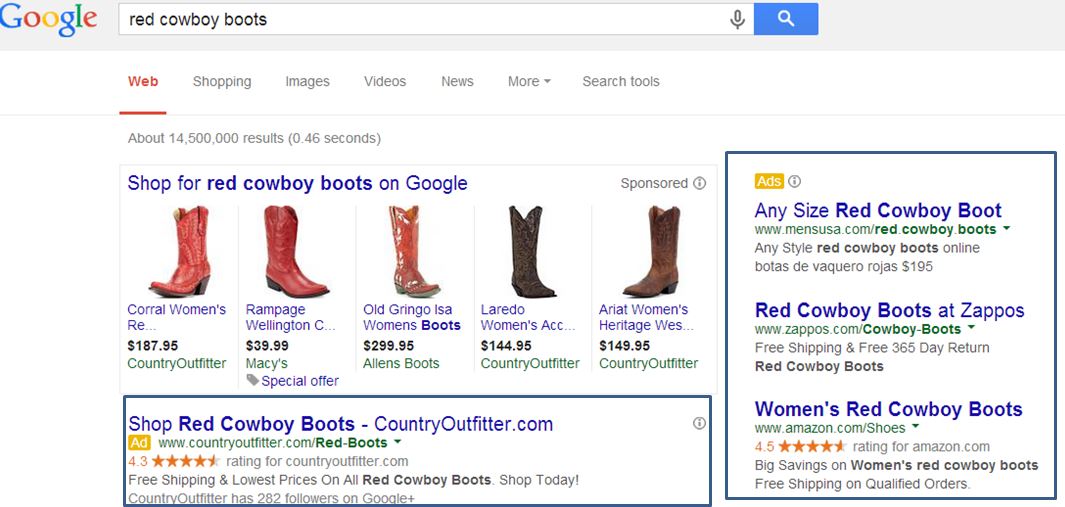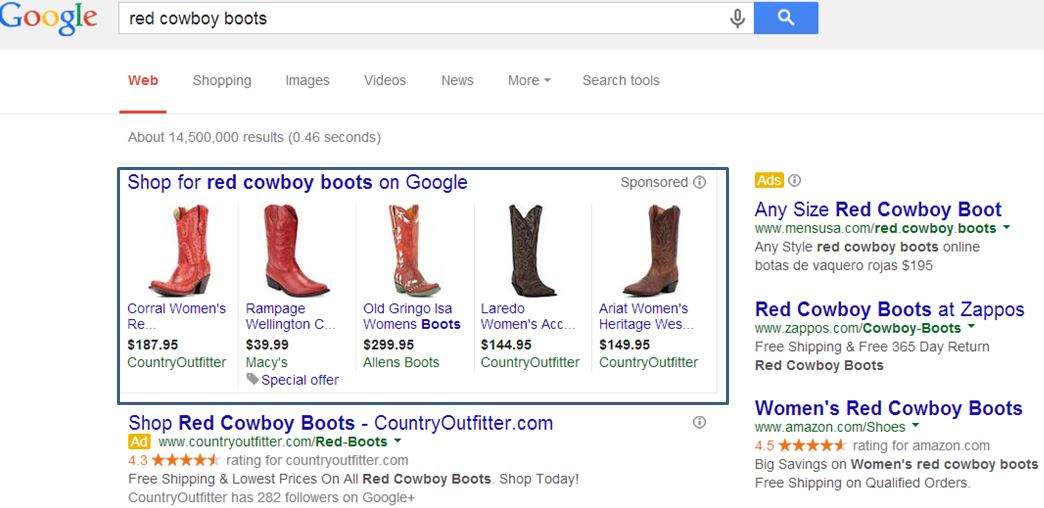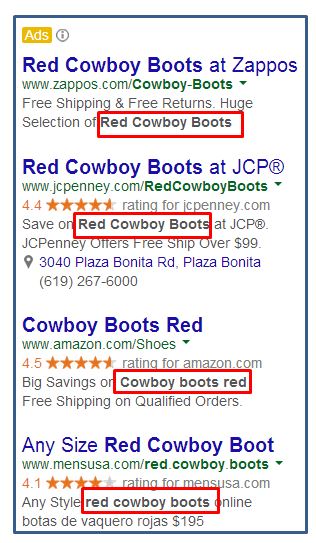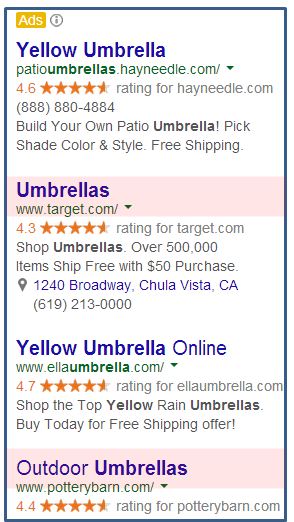Understanding AdWords Keyword Match Type with HIMYM

Google ads have an average click-through rate of 3.16%. For online advertisers AdWords ads are an opportunity to drive higher clicks and sales on Google search- a significant revenue driver.
To truly leverage AdWords campaigns you need to understand AdWords match types, and how they affect when your ads appear on search.
Below is an overview of AdWords keyword match types, and when you should use them in your AdWords campaign.
If you are unfamiliar with AdWords ads, review the summary below. If you are listing on AdWords, read on to AdWords Match Type to understand how match type impacts conversions and visibility on search.
AdWords Ads- Text ads that appear on Google search at the top and right of search result pages (SERPs) with text specific product information:

These ads are pay per click (PPC), which charge retailers a preset click amount for every ad click. Ads appear on search based on a searchers query and its match to keywords identified by advertisers.
Product Listing Ads (PLAs) – Display image ads which appear on search with product images and information:

Like text ads, Product Listing ads are PPC ads, and link out to a merchant’s website. Both ads are generated by user searches, and click out to a merchant’s online store. Unlike PLAs which focus on product information, AdWords text ads are based on keywords.
[ws_table id=”108″]
Ads appear on search pages based on a searchers query (e.g. red cowboy boots) and its match to keywords advertisers identified as relevant to their products (e.g. cowboy boots).
For example, if someone is searching for red cowboy boots, the search they use- such as ‘red cowboy boots’ should correlate to keywords identified to advertisers who sell related products, such as ‘cowboy boots’:

PPC AdWords ads appear when searchers search something that matches keywords advertisers have identified are relevant to their products. For example, an advertiser who sells cowboy boots might include ‘boot’ as a keyword for an AdWords ad campaign.
To maximize revenue on Google AdWords text ads, advertisers identify and refine keywords for campaign performance.
In addition to keywords themselves, advertisers identify keyword match type– or how precisely they want those keywords to relate to searcher queries.
Keyword match type identifies how closely you want Google to match your advertisements to keyword searches. There are four different keyword match types to choose from when advertising with Google AdWords, which delineate how broad or closely you want ads to appear related to selected keywords.
There are four types of keyword match types for AdWords ads, each which refine which search pages your ads appear on based on how closely your keywords match the entered Google query. Advertisers can select text ad match type for AdWords PPC campaign when creating or changing campaigns.
The four types of Google AdWords match types include broad match, modified broad match, phrase match, and exact match type.
Broad Match Type– Ads appear on keyword variations: synonyms, and related searches
Modified Broad Match Type– Ads appear when your target keyword is included in a search
Phrase Match Type– Ads appear for searches that include your keyword and close variations with terms following or preceding your keywords
Exact Match Type– Ads appear for searches which match your keyword exactly
Which type advertisers select may vary based on individual campaign goals, and the variables associated with each match type.
[ws_table id=”106″]
Here is Google’s explanation of how match type works for AdWords:
AdWords Broad match type is the widest net to cast for matching keywords with search queries. This is the default AdWords ad match type, and is designed to have your ads show up for the most searches, for more impressions.
Broad match enables ads to appear when they relate to advertiser identified keywords that include any word in any order from your keywords. This includes syllables, plurals and related searches that correlate with your keywords.

For example, if you are using broad match type for yellow umbrella, your ads might appear for searches including ‘umbrellas’, and ‘outdoor umbrellas’:

Broad match type is an effective keyword match type to drive impressions, but may not be the best choice for campaigns depending on the selected keywords.
Broad match type enables ads to appear for multiple searches- some of which may not be relevant to your products. For example a broad match type might generate your ads for searches which are too broad, or unrelated to your products. For example a search for ‘parasol’ or possibly ‘rain guard’ or ‘how I met your mother’ might generate ad results from broad keyword match type with a yellow umbrella related keyword.
While broad match may generate irrelevant ads (and related wasted ad spend) if used too liberally, it’s also a useful match type to help identify keywords. Broad match populates ads based on searches it deems related to your keywords- this is a handy way to identify new searches and phrases which relate to your products or website that you may not have identified.
AdWords phrase match type is a slightly more restrictive match type than broad match. Where broad match might encompass ‘dating’, phrase match is more like being ‘in a relationship’- slightly more restrictive than, but not as confining as ‘exclusive’.
The phrase match keyword match type matches searches and ads based on word order. The phrase match “yellow umbrella” will match ads for searches with the words yellow and umbrella in that exact order. Searches with additional terms will also generate your ads results, as long as the phrase match keywords are in their designated order.
With phrase match type “yellow umbrella” searches such as ‘yellow umbrella’, ‘buy yellow umbrella’ and ‘outdoor yellow umbrella’ will prompt your ad. The search ‘buy umbrella yellow’ or ‘yellow waterproof umbrella’ would not fit within the phrase match type parameters- so your ad would not appear for those search result pages.

AdWords phrase match type is a good match type option for campaigns which need more ad matching stricture than broad match, but less restricting than the exact match type.
Phrase match is less susceptible to irrelevant searches for AdWords ads matching than broad match, but advertisers are still prone to ads appearing for searches which don’t convert- which creates unnecessary ad or click spend. Inversely, phrase match limits impressions, which can decrease traffic and conversions, and negatively impact branding. Again, which match type you use for specific AdWords campaigns will depend on your AdWords goals and budget.
AdWords exact match type works exactly as it sounds. Google populates search results for your keywords only if the search exactly matches your keywords. Exact match type ensures ads appear only for searches which match the word or string of keywords you set up within AdWords. Exact match type dictates searches must match the keyword words and word order exactly.
Exact match for [yellow umbrella] ensures that AdWords appear for ‘yellow umbrella’ searches alone. Searches for ‘buy yellow umbrella’ or ‘umbrellas’ would not highlight your ads in search.

AdWords exact match type limits search result traffic much more so than both phrase and broad match type for AdWords ads. For retailers with a limited budget, or those focused on targeted clicks, exact match ensures users are searching for your product or service, and increases the likelihood of clicks and conversions.
AdWords modified broad match type is a matching type which is less restrictive than phrase and exact match types, but more stringent than broad match type. Modified broad match type allows advertisers to identify a single keyword for a broad match search which must be included in search.
You can think of modified search as a combination of exact and broad match type. One of the keywords is exact- it must be included in search, but since it’s coupled with broad match- ads still appear for broader related searches.
A modified broad match type for yellow +umbrella with generate ads for searches that must include the term umbrella, but can also include additional terms. Searchers looking for ‘red umbrella’ or ‘photo umbrella’ will generate ads with the modified broad match type in this scenario.

Unlike broad match, modified broad match would not populate results for a searches like ‘yellow parasol’ or ‘rain umbrellas’.
Modified broad match type is useful for advertisers who want to pinpoint specific terms, but order isn’t as important. With phrase, keywords must appear in a specific order- without any terms in between. Modified broad match allows advertisers to target terms with less emphasis on keyword order.
Keyword match types communicate to Google which searches you’d like your ads to appear for. To tell Google which searches which searches you don’t want your ads appearing, retailers use negative keyword match type.
Negative keyword match type applies to all regular match types (negative exact match type, negative phrase match type, negative broad match type) except modified broad match type.
[ws_table id=”109″]
For example, if your ads are appearing on searches with aren’t related to your site or products (e.g. yellow umbrella), you might exclude those searches (e.g. from triggering ads with the negative keyword match type.

Negative keyword match type is used by advertisers to exclude terms which aren’t relevant to their site or products. If you sell umbrellas for example, you may not want someone to click on your ad if they are looking for umbrella accessories such as an umbrella holder or patio furniture.
You can also choose to exclude terms which are relevant to your products but aren’t likely to convert. However be sure to test your ads, and before using negative keywords lower bids to see how your budget is impacted.
Similar to the other match types, consider your AdWords campaign goals, budget and ad attributes when choosing and optimizing keywords and keyword match type.
